Healthcare: A Global Solution
By Victoria Reyna Varville, MBA '21
 UIW’s Center for Medical Tourism Research (CMTR), part of the Liza and Jack Lewis Center of the Americas, has been at the forefront of research in the medical tourism industry for more than a decade. The CMTR is committed to serving as the world’s premier academic center for medical tourism research, providing quality literature and thought leadership on the economic, social justice and societal impacts of the industry around the globe.
UIW’s Center for Medical Tourism Research (CMTR), part of the Liza and Jack Lewis Center of the Americas, has been at the forefront of research in the medical tourism industry for more than a decade. The CMTR is committed to serving as the world’s premier academic center for medical tourism research, providing quality literature and thought leadership on the economic, social justice and societal impacts of the industry around the globe.
As the world adapts to what it means to live with COVID-19, and tourism subsequently picks up again, the CMTR’s founder and UIW faculty member, Dr. David G. Vequist IV, has been a sought-after voice of expertise on new trends in medical tourism from the likes of The New York Times and USA Today. And that’s not all. The CMTR most recently signed a contract with one of the top five hospital systems in the U.S. to conduct research regarding international patients travelling to this premiere healthcare facility for medical treatment. This system is famously known for its medical breakthroughs and advancements throughout its century-long history. To be considered, let alone selected to conduct research for this iconic hospital, along with the ongoing national media attention, is what Dr. Vequist calls an honor for UIW, the CMTR, and for him.
“UIW is being mentioned in The New York Times, along with elite research universities like Harvard, Columbia and Stanford, so it’s a source of pride for me,” Vequist shared. “And the great thing for the CMTR and for the Lewis Center of the Americas is that we have been able to secure a number of exciting collaborations, such as this new research project with one of the best healthcare facilities in the world. We are also working on a new joint effort with the Mexican ministries of economy and tourism to help develop the medical tourism industry in Mexico by providing training on the topic. Some of these opportunities may not be happening if we weren’t being seen and heard by people around the world because of the media attention.”
That work in Mexico is no small opportunity for the CMTR either. Vequist has been tapped by Mexico’s Secretaría de Economía and Secretaría de Turismo to develop and deliver training to the country’s medical tourism healthcare facilities. It’s a project he says aligns with the mission of the Lewis Center, which is to “promote better relations and understanding among the people and nations of the United States, Mexico, Canada, Central and South America through cooperative study, research, service and dialogue.”
When thinking back on the journey to this moment in the CMTR’s history, Vequist is amazed that one research paper ultimately led to him becoming one of the world’s leading experts on medical tourism. When asked what initially drew him to such a niche area of research, he chuckled and admitted, “Well, the honest answer is having come from industry, and before that, consulting, when I came to academia, I didn’t have a research agenda.”
He went on to explain that he and a colleague of his, a finance professor from St. Mary’s University, decided to co-author an article about patients traveling for medical treatment. During his time in the healthcare industry as an executive for Methodist Healthcare System, Vequist had seen first-hand how tourists from Mexico traveled to San Antonio for a weekend of healthcare and shopping at North Star Mall.
“And so I was familiar with this interesting mixture of both medical and tourism combined here in San Antonio, and it was a pretty nice revenue stream for the hospital,” he explained.
Following the article’s publication, Vequist began receiving requests for commentary and opinion on the growing medical tourism industry. The calls followed a similar pattern, whether from bloggers and reporters writing about the topic, or organizers of national healthcare conferences in search of a keynote speaker. I’m working on (insert story, article, event) about medical tourism, they began. There don’t seem to be many experts on medical tourism, but I saw your publication…
 And the rest, as they say, is history. Vequist had found his research focus and invitations quickly came in, calling him to present on the national stage in Washington D.C., San Francisco and more. It was after one of his keynote addresses at a national medical conference that he was approached by the vice president of international affairs for Medtronic, a leader in global healthcare technology, with a suggestion that Vequist launch a medical tourism research center at the University. With that, the UIW Center for Medical Tourism Research was officially born in 2007.
And the rest, as they say, is history. Vequist had found his research focus and invitations quickly came in, calling him to present on the national stage in Washington D.C., San Francisco and more. It was after one of his keynote addresses at a national medical conference that he was approached by the vice president of international affairs for Medtronic, a leader in global healthcare technology, with a suggestion that Vequist launch a medical tourism research center at the University. With that, the UIW Center for Medical Tourism Research was officially born in 2007.
Since then, Vequist’s research has taken him around the globe to places including Seoul, Mexico City, Istanbul, Kuala Lumpur, Zurich, Manila, Havana, Berlin, Bogota, Venice and more. During his travels, he’s met with state officials, advised governments on the impact of medical tourism on their economies, and delivered keynote address at conferences with international audiences and leaders in global healthcare. In fact, his knowledge and expertise regarding medical tourism have been shared on every continent except Australia and Antarctica, the former which he hopes to soon visit.
However, in the immediate future, Vequist is shifting the CMTR’s focus a bit closer to home. As a key entity of the UIW Liza and Jack Lewis Center of the Americas, his work will take him on professional trips to Mexico, the Dominican Republic and Colombia this year, in addition to the agreements the CMTR is entering into with one of the best hospital systems in the U.S. and the Mexican ministries of economy and tourism. All these efforts are in service of the CMTR’s short-term goal of having more of an impact on the Americas, and it comes at a crucial time in healthcare. The CMTR’s research indicates that the global population is sicker than ever due to rising obesity rates, mental health issues and poor nutrition. In addition, the COVID-19 pandemic caused people to delay preventative and interventive treatment. All of this combined with a global shortage of healthcare workers may paint a bleak picture, but Vequist is optimistic and insists medical tourism offers a silver lining.
“I think the idea of sharing resources among countries has always been a natural free market response that has allowed industries to continue to grow,” he explained. “There is still a need for local healthcare … but there can be other things that we can get from, for example, Mexico, our largest trading partner, and that frees us up to think innovatively about other ways in which to serve people. It’s truly an organic, wonderful thing, like God intended us to work with other people, and by working with other people, we then find ways to meet more people’s needs.”
And service is, in the end, what it all comes back to. At the heart of the Center for Medical Tourism Research’s work is a resolve to better the lives of people around the world through improved access to quality healthcare. It’s a goal that Vequist carries near and dear, one that he views as a continuation of the work of the Sisters of Charity of the Incarnate Word, UIW’s founding congregation.
“I almost lucked into this idea of medical tourism, and then it turns out, medical tourism is linked to the original Sisters’ mission in ways that I could have never imagined,” he beamed.
He talked through the story every UIW community member knows by heart. The story of the Sisters making the difficult journey to Texas in the 1800s in response to a cholera epidemic, how they began a hospital, then an orphanage, then a school, leading to what would eventually be the University of the Incarnate Word.
“We have education and healthcare being two of the first missions that the Sisters brought with them from France, and more than one hundred years later what we have is a premier medical tourism research center which focuses on globalization, healthcare and research,” he continued. “Particularly, the education of topics around the globalization of healthcare happens to occur right here at the University of the Incarnate Word. It was almost like in 1881, the seeds were planted, and now we have this blooming center that is one of the fruits of what the Sisters originally brought here.”

